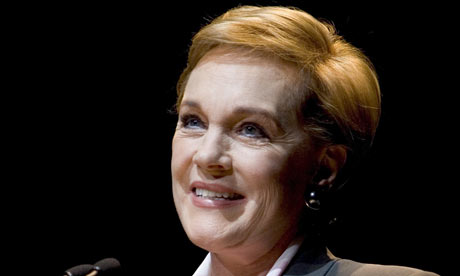
The hills could soon be alive with the sound of music again. Scientists working with the actor and singer Julie Andrews are carrying out a trial of synthetic vocal cords to replace those damaged when she underwent surgery.
Animal trials of the artificial vocal cords are under way and researchers expect to test them in humans for the first time in the next two years.
Andrews, 74, who is most famous for playing Maria von Trapp in The Sound of Music, lost her ability to hold a note, not to mention her five-octave range, in 1997 when surgery to remove non-cancerous nodules from her vocal cords left them badly scarred.
Scar tissue is much stiffer than healthy vocal cord tissue and disrupts the natural vibrations of the voicebox, preventing the production of different musical notes. Some patients who have surgery on their voiceboxes are unable to speak afterwards because of scar tissue formation.
A team led by Robert Langer at MIT in Cambridge, Massachusetts, is working with Andrews's laryngeal surgeon, Steven Zeitels at Harvard Medical School, on a rubbery gel that can be injected into the scarred area of her voicebox and hopefully restore it to its former glory.
The team has begun animal trials with a material called polyethylene glycol, a non-toxic material that has the same elasticity as vocal cords and should therefore mimic the way they vibrate and produce sounds. The gel would probably be injected after the scar tissue has been surgically removed.
"We've tested them in animals and the initial results are going quite well in terms of safety and efficacy. Our hope is that in the next couple of years there will be a clinical trial starting so we can see how well this might work in human beings," Langer said.
The procedure is likely to benefit a wider group of patients than vocalists, including public speakers and people who have undergone surgery on their larynx for cancer and other diseases.
If the procedure works, it could give a voice back to a large group of patients who have few other options, Langer said. "If someone is a singer, it's particularly difficult. There might be surgical procedures, but if the cords are really damaged, the singer is no longer able to sing. And for other people, some are not even able to speak," Langer said.
Langer talked about the breakthrough while visiting London to receive the Millennium Technology Prize for his research on tissue regeneration and medical materials that release drugs into the body in a controlled manner.

